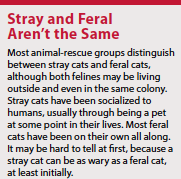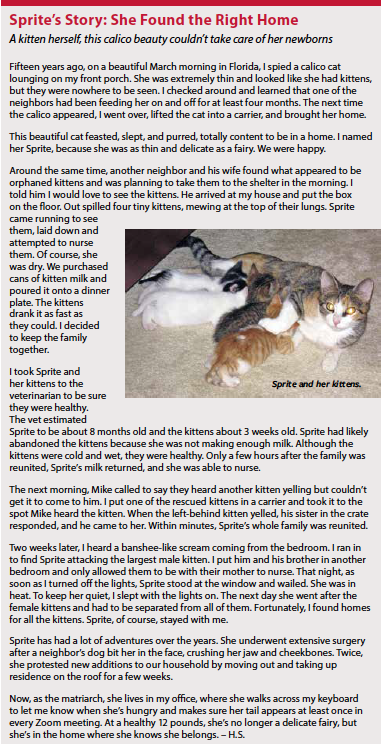Most cat lovers will tell you that cats often find you, whether you’re looking for a cat or not. Some cats just seem to sense that there is a home with a person needing feline companionship. A small kitten or friendly cat may just let you catch them, or they may walk right on into your home. A skittish cat, however, may need a baited trap. Once you catch the cat, the job of ensuring that she’s “available” begins.
Start by letting local shelters, rescue groups, and animal-control officers know about the cat. You might even consider putting up posters in case the cat is lost and not a homeless stray. Many feral-cat groups spay, neuter, and vaccinate their charges in colonies they supervise. The treated cats are often marked with a tattoo or ear clip. Most groups also keep records with photos, so you may quickly learn if the cat is a stray or simply lost.
The Quarantine Period
Any stray cat should undergo a quarantine period, especially if you have other animals, due to the possibility of disease. Most importantly, you want to avoid exposure to rabies for you, your family, and any other pets. Ten days is recommended as a rabies quarantine period. Quarantine also minimizes the risk of sharing other infectious diseases.
to the possibility of disease. Most importantly, you want to avoid exposure to rabies for you, your family, and any other pets. Ten days is recommended as a rabies quarantine period. Quarantine also minimizes the risk of sharing other infectious diseases.
During quarantine, you’ll want to assess the newcomer’s temperament and let your current pets, if you have any, adapt to the sight, smell, and sound of the new cat in the house.
The ideal setup is a separate room with a door you can close, but if that’s not possible, a large dog crate with food and water bowls, a litterbox, and a box for the cat to hide in will work. If you do use a crate, it is important to prevent any nose-to-nose contact between the new cat and any current feline residents through its door, as some diseases, like feline leukemia, can be transmitted by this type of casual contact.
If you notice fleas, ticks, or mites, treat the cat before bringing her into your home. A bath followed by a topical treatment is best. Have the cat evaluated by a veterinarian promptly, especially if the cat is ill or becomes ill during the quarantine. At that visit, you should request a test for feline leukemia (FeLV) and feline immunodeficiency virus (FIV). A fecal sample to rule out internal parasites is also important. Vaccinations can be given to a healthy stray after quarantine. Your veterinarian also can scan the cat for a microchip that might indicate a lost cat.
Vaccinations will be given with the assumption that the cat has not been previously vaccinated. Microchip the cat so she won’t be lost again. Schedule a spay/neuter if needed (a spayed female will have a scar).
Emotional Assessment
Your new family member may have some emotional scars or behavioral baggage. Cats can become strays for a variety of reasons. Someone may have dumped the cat out near your home. People often assume that rural families don’t mind adding another cat to their barn cat or pet population. The cat may have escaped during a trip or a move. Some cats are dropped off due to aggression or house soiling. It may take some time for those behavior problems to become evident.
Make introductions to any current pets slowly. Rubbing towels on the new pet as well as the established pets and putting those towels on the other side of a barrier allows the animals involved to become familiar with the new scents. Consider using some feline pheromone sprays or diffusers such as Feliway.
 Encounters across a tall baby gate can be a non-threatening way to become acquainted. If you have a rarely used room, that is best for face-to-face meetings as it will be “neutral” territory. All pets should be on leashes, and you need a couple of thick towels handy in case you need to intervene. Never put your hands between two fighting cats, as you may be injured.
Encounters across a tall baby gate can be a non-threatening way to become acquainted. If you have a rarely used room, that is best for face-to-face meetings as it will be “neutral” territory. All pets should be on leashes, and you need a couple of thick towels handy in case you need to intervene. Never put your hands between two fighting cats, as you may be injured.
Once you feel the cats involved are compatible, be sure you have enough food, water bowls, and litterboxes. The standard recommendation for litterboxes is the number of cats you have plus one. Each cat should have their own food and water bowl. Food bowls can be limited to the number of cats you have if you feed meals. Watch for bullying or aggression from any cat.
If you can’t integrate a stray into your household, contact local shelters and rescues. If possible, offer to keep fostering the cat while putting up her photo and bio to encourage an adopter. The cat is likely better off with you, even temporarily. Consider it an honor that a stray cat chose you.




